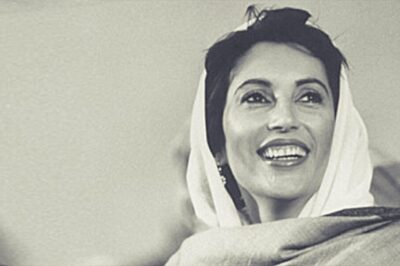December 27, 2024, marks the 17th death anniversary of Benazir Bhutto, Pakistan’s first female Prime Minister and a global icon for women’s empowerment, diplomacy, and advocacy. Her life and career continue to demonstrate the struggles and achievements of women in leadership, particularly in a patriarchal society. When discussing her legacy, it is critical to acknowledge her activism, women’s empowerment, and diplomatic contributions—all of which continue to motivate millions worldwide.
Born on June 21, 1953, in Karachi, Benazir Bhutto was the daughter of Zulfikar Ali Bhutto, a charismatic leader and founder of the Pakistan Peoples Party (PPP). Educated at Harvard and Oxford, she shattered traditional norms by becoming the first woman to lead a major political party in Pakistan. Following the execution of her father in 1979, Benazir faced imprisonment and exile, yet she remained steadfast in her commitment to democracy and justice. Her perseverance culminated in her historic election as Prime Minister in 1988, making her the first woman to lead a Muslim-majority country. Despite the deeply entrenched male-dominated societal structure and political opposition, Benazir’s ascent symbolized hope for women’s leadership in conservative societies.
Benazir Bhutto’s tenure was marked by her ability to navigate complex diplomatic landscapes with a vision that transcended traditional statecraft. She advocated for Pakistan’s integration into the global economy and sought to strengthen ties with neighboring countries. Her government prioritized regional cooperation, particularly within the South Asian Association for Regional Cooperation (SAARC). Benazir’s diplomacy extended beyond formal negotiations; she championed the inclusion of women in international relations and emphasized their roles in conflict resolution and peacebuilding. Her addresses at international forums underscored the necessity of gender-inclusive policies for sustainable development and global security.
One of Benazir Bhutto’s most significant contributions was her unwavering commitment to women’s empowerment in a society where gender disparities were deeply ingrained. Her policies focused on improving women’s access to education, healthcare, and economic opportunities. Under her leadership, initiatives such as the Lady Health Workers Program in 1994 provided healthcare access to rural women, empowering them as frontline agents of change. Recognizing education as a cornerstone for breaking the cycle of poverty and oppression, she advocated for increased budget allocations for female education. Her efforts made tangible progress in narrowing gender gaps in education and healthcare.
Benazir Bhutto’s advocacy for women’s rights extended to her global platform, where she highlighted the unique challenges faced by women in Muslim-majority countries. Her speeches at the United Nations and other international venues emphasized that empowering women was not merely a social issue but a strategic imperative for economic and political progress. In her autobiography, “Daughter of Destiny,” Benazir articulated her vision for a society where women could participate fully in all aspects of life. She believed women’s empowerment was integral to combating extremism, fostering inclusive governance, and driving social development.
Also Read: Manmohan Singh – Architect of economic reform and diplomatic bridge-builder
Operating in a male-dominated political arena, Benazir Bhutto faced relentless scrutiny and opposition, yet she transformed these challenges into opportunities to demonstrate resilience and leadership. Her perseverance through personal and professional setbacks remains a hallmark of her legacy. She navigated the intersection of cultural expectations and political responsibilities, emerging as a role model for women in global leadership. Her career, however, was not without controversy. Allegations of corruption marred her government, and her tenure was cut short twice by dismissals orchestrated by political rivals. Despite these setbacks, Benazir’s resolve to fight for democratic values and gender equality never wavered.
On December 27, 2007, Benazir Bhutto’s life was tragically cut short in a terrorist attack during an election rally in Rawalpindi. Her assassination was a profound loss, not only for Pakistan but for advocates of democracy and human rights worldwide. The unfortunate incident highlighted the enormous risks faced by individuals who dare question the status quo and advocate for progressive change. In the years since her passing, her vision and ideals have been institutionalized through initiatives like the Benazir Income Support Programme (BISP), launched posthumously by her party in 2008. This program continues to provide financial aid to millions of underprivileged women in Pakistan, embodying her mission of economic empowerment.
Benazir Bhutto’s legacy has been acknowledged globally through numerous accolades and tributes. She was named one of Time magazine’s 100 Most Influential People of the 20th Century, and in 2008, the United Nations posthumously honored her with the UN Human Rights Prize. Her life has inspired countless books, documentaries, and academic studies, solidifying her position as a trailblazer for women in diplomacy, governance, and advocacy. Scholars frequently compare her leadership style to iconic figures like Indira Gandhi and Margaret Thatcher, noting her unique blend of empathy, strategic vision, and political acumen.
Bhutto’s journey offers invaluable lessons for aspiring women leaders, particularly in societies where gender roles remain rigidly defined. Her ability to persevere through adversity is a blueprint for overcoming barriers in male-dominated environments. Benazir’s emphasis on inclusive governance and diversity illustrates the revolutionary power of women in leadership. Her support of underrepresented voices demonstrates how genuine leadership goes beyond individual aspirations in order to improve entire communities.
Seventeen years after her assassination, Benazir Bhutto remains a hope and inspiration for women striving to break political, diplomatic, and advocacy barriers. As we mark her death anniversary, we must remember her legacy by promoting gender equality and empowering the next generation of female leaders. Benazir’s vision of a better world and a modern, inclusive Pakistan exists because of the many people she touched and the movements she sparked.
International Relations Scholar interested in National Security strategies, with a good focus on Geo-Politics, Foreign Policy, and Public & Cultural Diplomacy.








